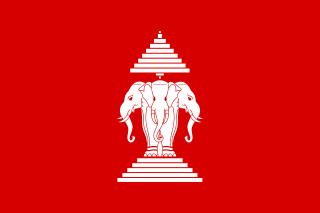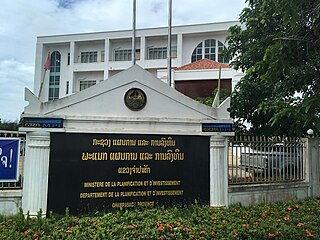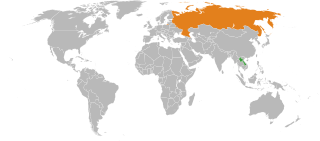Related Research Articles

Laos, officially the Lao People's Democratic Republic (LPDR), is the only landlocked country and one of the two Marxist-Leninist states in Southeast Asia. At the heart of the Indochinese Peninsula, Laos is bordered by Myanmar and China to the northwest, Vietnam to the east, Cambodia to the southeast, and Thailand to the west and southwest. Its capital and largest city is Vientiane.

The foreign relations of Laos, internationally designated by its official name as the Lao People's Democratic Republic, after the takeover by the Pathet Lao in December 1975, were characterized by a hostile posture toward the West, with the government of the Lao People's Democratic Republic aligning itself with the Soviet bloc, maintaining close ties with the Soviet Union and depending heavily on the Soviets for most of its foreign assistance. Laos also maintained a "special relationship" with Vietnam and formalized a 1977 treaty of friendship and cooperation that created tensions with China.

The Kingdom of Laos was the form of government in Laos from 1947 to 1975. Located in Southeast Asia at the heart of the Indochinese Peninsula, it was bordered by Burma and China to the northwest, North Vietnam to the east, Cambodia to the southeast, and Thailand to the west and southwest. The country was governed as a constitutional monarchy beginning with its independence on 9 November 1953. It survived until December 1975, when its last king, Sisavang Vatthana, surrendered the throne to the Pathet Lao during the civil war in Laos, who abolished the monarchy in favour of a Marxist–Leninist state called the Lao People's Democratic Republic, which has controlled Laos ever since.

The Laotian Civil War was waged between the Communist Pathet Lao and the Royal Lao Government from 23 May 1959 to 2 December 1975. The Kingdom of Laos was a covert theater during the Vietnam War with both sides receiving heavy external support in a proxy war between the global Cold War superpowers. The fighting also involved the North Vietnamese, South Vietnamese, American and Thai armies, both directly and through irregular proxies. The war is known as the Secret War among the American CIA Special Activities Center, and Hmong and Mien veterans of the conflict.

Green papaya salad is a spicy salad made from shredded unripe papaya. It is generally believed to have been created by the Lao people and is considered one of the national dishes of Laos. Green papaya salad is also popular in neighbouring Thailand's Isan region, whose population is mainly composed of ethnic Lao and from where it spread to the rest of Thailand. Green papaya salad has also spread to the rest of the continental Southeast Asia, as well as Xishuangbanna (China).

The Laos national football team is the men's national football team that represents the Lao People's Democratic Republic. It is affiliated with the Asian Football Confederation (AFC) and the regional ASEAN Football Federation (AFF).

At present, there is no known Scouting program in Laos. It is only one of the four of the world's independent countries that do not have Scouting.

French is spoken by a significant minority in Laos. Laos has the second largest Francophone community in Southeast Asia after Vietnam and ahead of Cambodia. French is used as an administrative language and is also widely present in commerce, and is also studied by over a third of students in Laos. Consequently, the language enjoys a healthier status in Laos compared to other Francophone Southeast Asian countries, although its influence is still under threat from the encroaching use of English.

The French protectorate of Laos was a French protectorate in Southeast Asia of what is today Laos between 1893 and 1953—with a brief interregnum as a Japanese puppet state in 1945—which constituted part of French Indochina. It was established over the Siamese vassal, the Kingdom of Luang Phrabang, following the Franco-Siamese crisis of 1893. It was integrated into French Indochina and in the following years further Siamese vassals, the Principality of Phuan and Kingdom of Champasak, were annexed into it in 1899 and 1904, respectively.

Laos is a Buddhist-majority nation with the officially recognised Muslim population approximately constituting 0.01% of the total population as of 2008 census. The majority of Laotian Muslims are Sunni. Laotian Muslims can be found in the capital, Vientiane, which has two mosques, as well as other urban areas such as Savannakhet and Oudomxay; the latter of which had a mosque constructed there in June 2016. Laotian Muslims are an ethnically diverse group, mainly consisting of ethnic Lao, Chin Haw, Chams, Tamils and Pashtuns, with interracial marriages being increasingly popular. They are generally engaged in trade, agriculture, cosmetics, clothing and business though some have attained official roles with the government.

The Laos national rugby union team represents Laos in international rugby union. The team's first international match was against Malaysia in 1974, losing 34 points to 10. After this the Laotian team did not field an international side again until 2006. With the recent reorganisation of the Asian rugby union competition structure they are set to play more often in the future. The Lao Rugby Federation is the governing body. Laos has been an associate member of World Rugby since November 2004.

Asia Rugby, formerly the Asian Rugby Football Union (ARFU), is the governing body of rugby union in Asia under the authority of World Rugby. Founded in 1968 by eight charter nations, the Union today has 36 member unions in countries across Asia, stretching from Kazakhstan to Guam.

The Indonesia national rugby union team represents Indonesia in rugby union. They are nicknamed the "Rhinos". The team is a full member of World Rugby. They have yet to play in the Rugby World Cup. The Indonesian squad was formed in 2006 to attend the IRB sanctioned Six Division Asian Rugby Football Tournament between Brunei, Laos, Cambodia and Indonesia. They currently compete in Division 3 South-East in the Asian Rugby Football Union.

Laos–Russia relations are the current and historical relations between Laos and the Russian Federation. On 31 December 1991, Laos recognised the Russian Federation as the successor state to the Soviet Union, after the latter's dissolution. Laos has an embassy in Moscow, while Russia has an embassy in Vientiane.
Rugby union in Cambodia is a minor but growing sport. Its governing body is the Cambodian Federation of Rugby.
Rugby union in Vietnam is a minor but growing sport, with the national team managed by Yale graduate Thao Do.
The Center for Public Policy Analysis (CPPA), or Centre for Public Policy Analysis, was established in Washington, D.C., in 1988 and describes itself as a non-profit, non-partisan, think tank and research organization. The CPPA is a non-governmental organization (NGO) focused on foreign policy, national security, human rights, refugee and international humanitarian issues. Its current executive director is Philip Smith.
The Laos women's national rugby union team is a national sporting side that represents Thailand in women's rugby union. They first played international sevens rugby in 2007 at the South East Asia sevens, where they finished third. They then played a ten-a-side international against Cambodia in 2009, and in 2010 they won a non-test match developmental tournament involving Thailand and the Philippines. Their first full test was against Thailand in 2011.
The Laotian diaspora consists of roughly 800,000 people, both descendants of early emigrants from Laos, as well as more recent refugees who escaped the country following its communist takeover as a result of the Laotian Civil War. The overwhelming majority of overseas Laotians live in just three countries: Thailand, the United States, and France.

The Laos national badminton team represents Laos in international badminton team competitions. It is managed by the Badminton Lao Federation. The Laotian team participated in the Southeast Asian Games and won three bronze medals in 1959 and 1961. The national team also competes in the Lao International, also known as the BEERLAO International Series.
References
- ↑ "International Rugby Board". Archived from the original on 28 September 2011. Retrieved 25 September 2011.
- ↑ "Lao Rugby Federation".
- ↑ http://www.cambodiarugby.org/content.php?secid=10&catid=16&id=12 Cambodian Federation of Rugby, history, accessed 28 June 2009